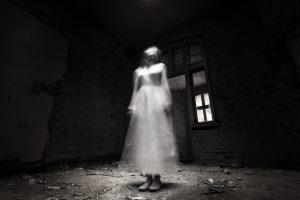 About half of all Americans believe in ghosts, with 22% reporting a personal experience with ghostly phenomena, according to a 2009 CBS News poll. Science and religion have long competed to explain seemingly paranormal experiences, such as hearing the voice of a deceased loved one or seeing ghostly figures. While no one can say with certainty that ghosts aren’t a part of our world, psychological phenomena may explain many common experiences.
About half of all Americans believe in ghosts, with 22% reporting a personal experience with ghostly phenomena, according to a 2009 CBS News poll. Science and religion have long competed to explain seemingly paranormal experiences, such as hearing the voice of a deceased loved one or seeing ghostly figures. While no one can say with certainty that ghosts aren’t a part of our world, psychological phenomena may explain many common experiences.
Suggestibility and Priming
People are highly social creatures, and this means they’re also highly suggestible. If you see another person behaving fearfully, for example, you’re more likely to feel fear, even if there’s no obvious threat.
Suggestibility can fuel myths about ghosts and haunted houses, particularly in an environment that seems creepy. If you stay at an ostensibly haunted house, you’re primed to see ghosts because you’ve been told you might. This means you might interpret a strange noise as a sign that a ghost is present, particularly if other people seem frightened by the noise. Old and abandoned houses and locations that have a scary story—such as a hotel where someone was killed, or a home where someone committed suicide—can further prime your mind to “see” ghosts, even when you might otherwise explain away unusual apparitions and sounds.
Hallucinations
It’s easy to think of hallucinations as the domain of people who are disconnected from reality, but hallucinations are fairly common. About 10% of people who don’t have psychiatric issues report experiencing a hallucination at least once. People are more likely to hallucinate after the death of a loved one, and a large portion of people who have lost close family members report “seeing” or “hearing” the family member shortly after his or her death.
If you have vision or hearing problems, your odds of hallucinating are greatly increased, as degenerative conditions that affect the senses can cause you to perceive things that aren’t really there.
Sleep Issues
Perhaps one of the most frightening and common human experiences is the “phantom face.” Sleep paralysis helps to keep you safe when you’re sleeping. It prevents you from jumping out of your bed when you dream you’re jumping on a trampoline and ensures that you don’t actually hit someone when you dream you’re in a fight. Sometimes, though, sleep paralysis lasts a few moments longer than sleep itself. This can cause you to wake up unable to move, and images from your dreams can make their way into your waking life, seeming very real.
About 40% of people report seeing an image, such as a phantom face, upon waking up. This phenomenon can be terrifying, but it’s not caused by ghosts. The technical term for this type of sleep-induced hallucination is a hypnagogic hallucination.
Connecting Unconnected Things
The human mind is incredibly adept at building connections. This is the reason we’re able to master complex math, build seemingly intelligent machines, and remember vast quantities of information. But this connection-building tendency can also cause people to believe things that aren’t true. Apophenia is the tendency to see connections between unconnected events. This tendency can cause you to interpret mundane experiences as supernatural. For example, if you dream about your grandmother and then hear her favorite song on the radio, you might conclude that she’s communicating with you.
Pareidolia, a related phenomenon, occurs when people “complete” incomplete images. There are mundane examples of this in everyday life. Anyone who has noted that the front of a car looks like a face is engaging in pareidolia. Pareidolia, however, can also cause people to see ghostly images. Your mind, for example, might perceive a cloud of dust as a face. Combined with high suggestibility, apophenia and pareidolia can cause you to see things that aren’t there. And while the two behaviors can be associated with some mental health conditions, they’re normal cognitive processing mechanisms that everyone engages in from time to time.
References:
- Alfano, S. (2009, February 11). Poll: Majority believe in ghosts. CBSNews. Retrieved from http://www.cbsnews.com/2100-500160_162-994766.html
- Pareidolia. (n.d.). The Skeptic’s Dictionary. Retrieved from http://skepdic.com/pareidol.html
- Poulsen, B. (2012, July 31). Being amused by apophenia. Psychology Today. Retrieved from http://www.psychologytoday.com/blog/reality-play/201207/being-amused-apophenia
- Sacks, O. W. (2012). Hallucinations. New York, NY: Alfred A. Knopf.

The preceding article was solely written by the author named above. Any views and opinions expressed are not necessarily shared by GoodTherapy.org. Questions or concerns about the preceding article can be directed to the author or posted as a comment below.

 Bumps in the Night: What Causes Nightmares?
Bumps in the Night: What Causes Nightmares? Nothing to Fear but Fear Itself: Breaking Free from Invisible Chains
Nothing to Fear but Fear Itself: Breaking Free from Invisible Chains Why Stalkers Stalk—and What to Do If You're a Victim
Why Stalkers Stalk—and What to Do If You're a Victim

Please fill out all required fields to submit your message.
Invalid Email Address.
Please confirm that you are human.
Leave a Comment
By commenting you acknowledge acceptance of GoodTherapy.org's Terms and Conditions of Use.